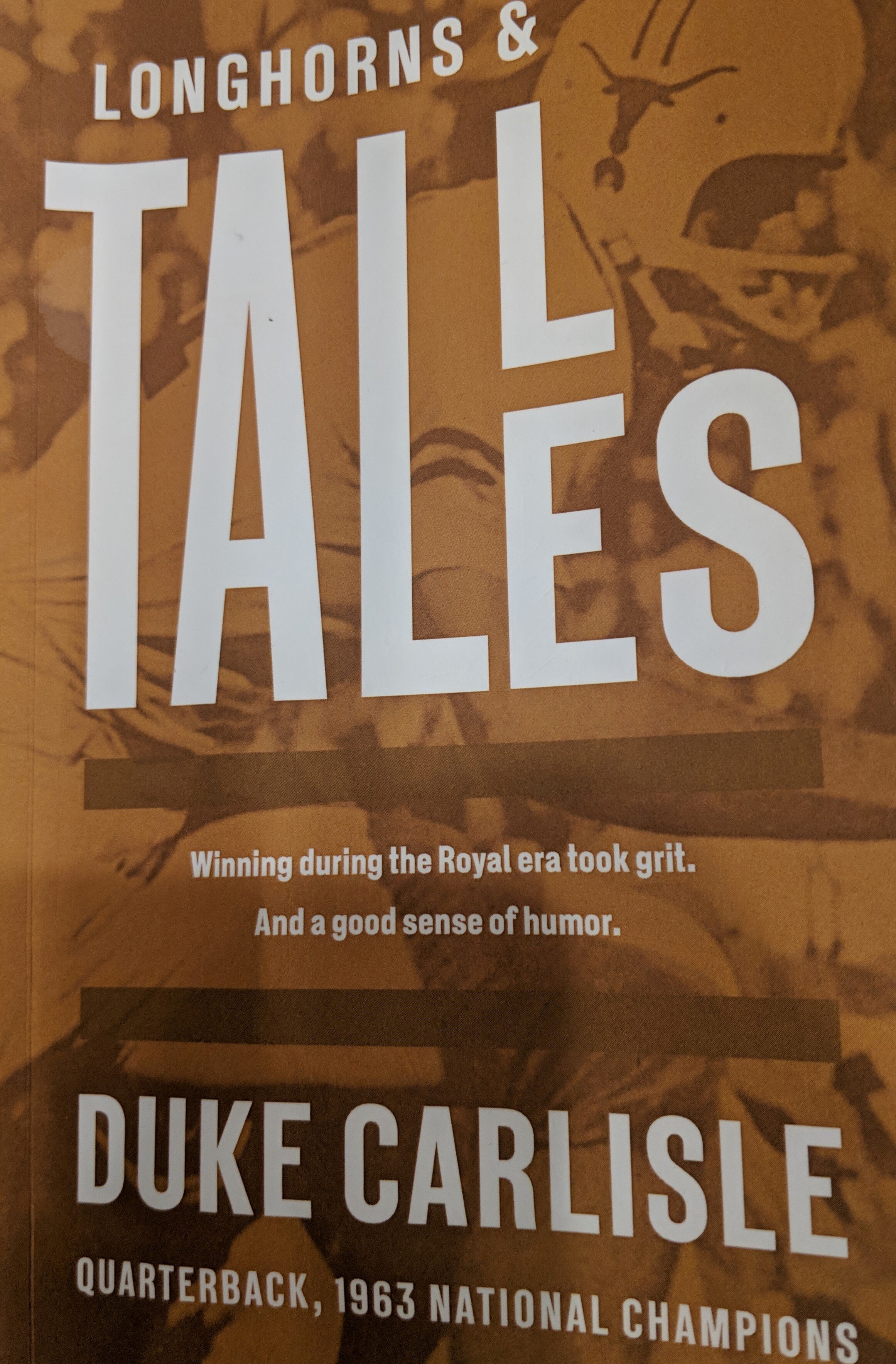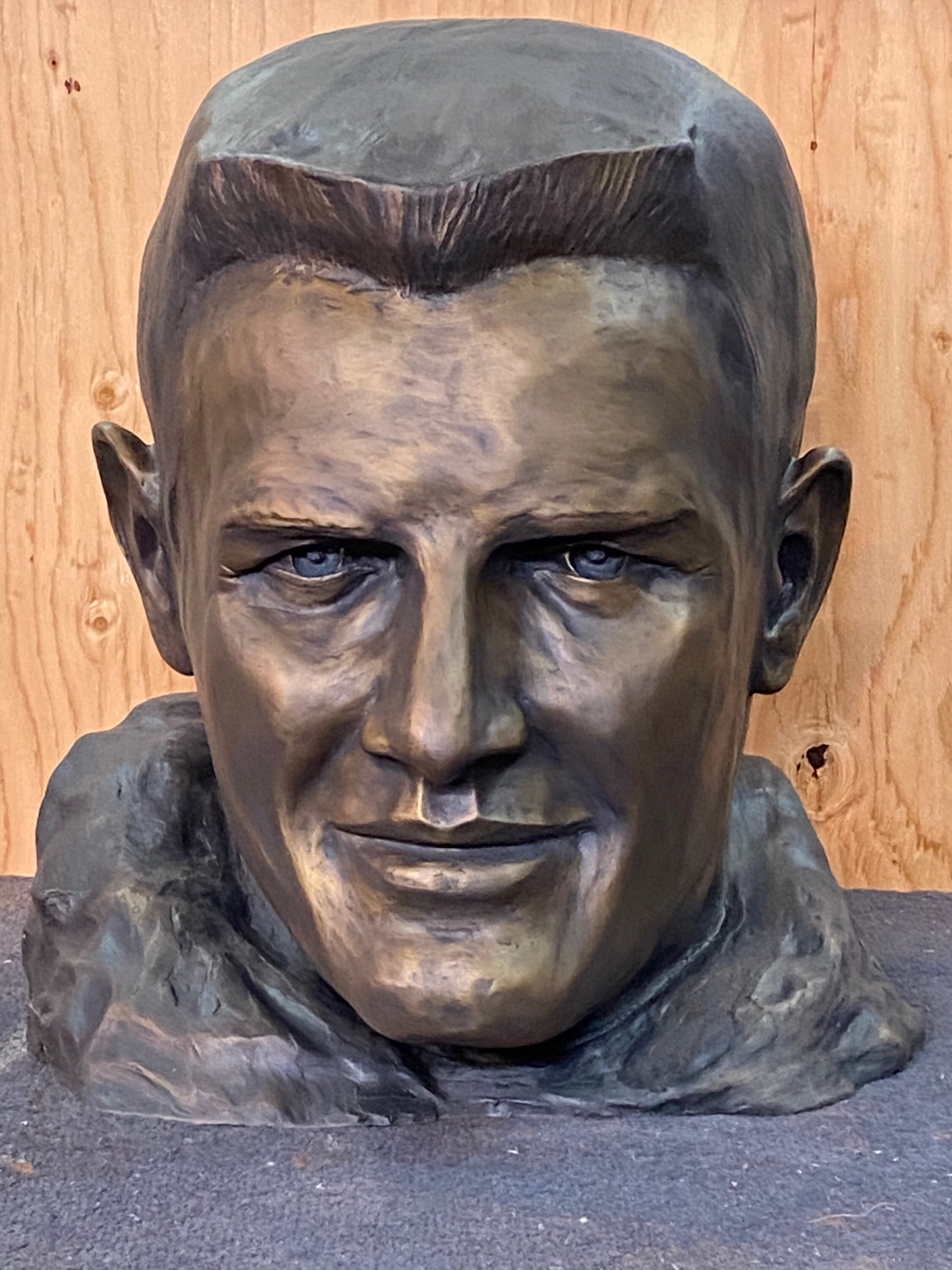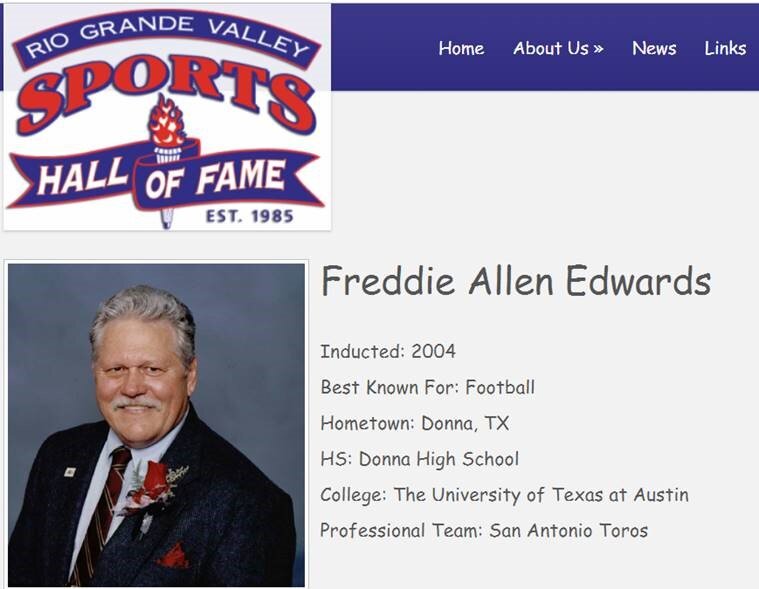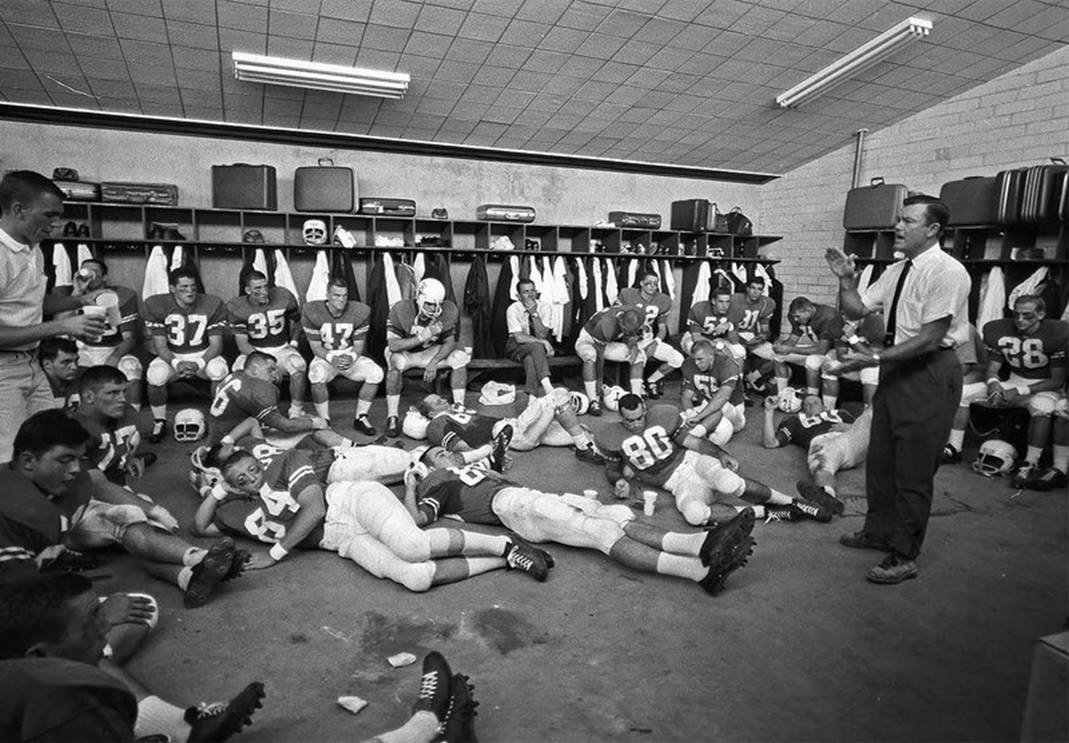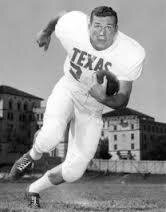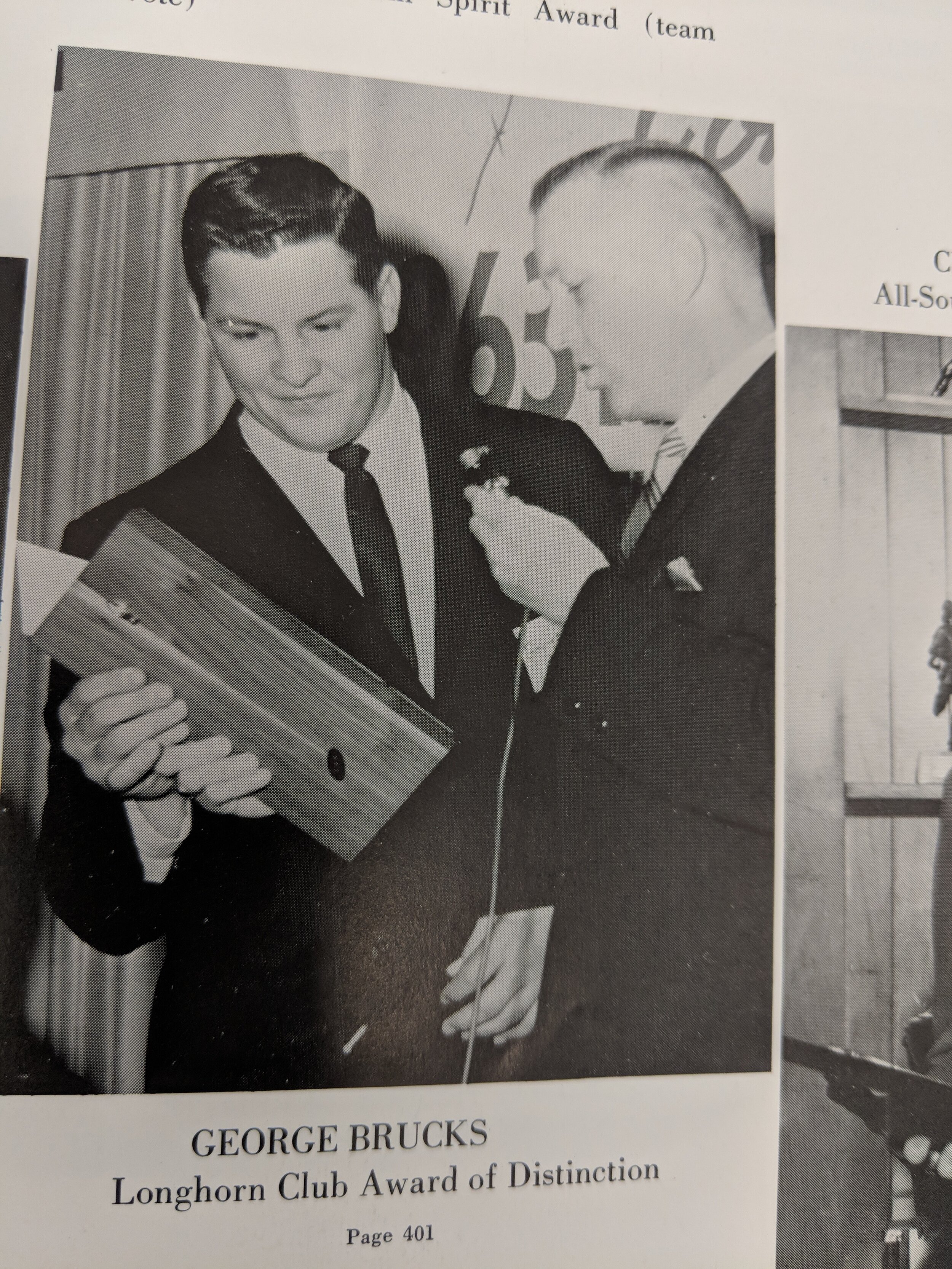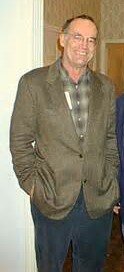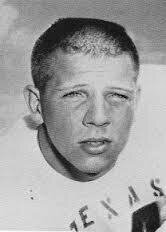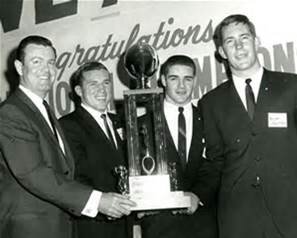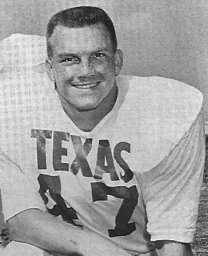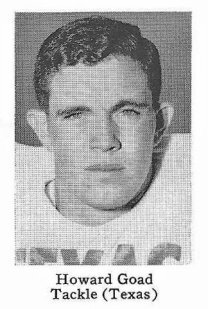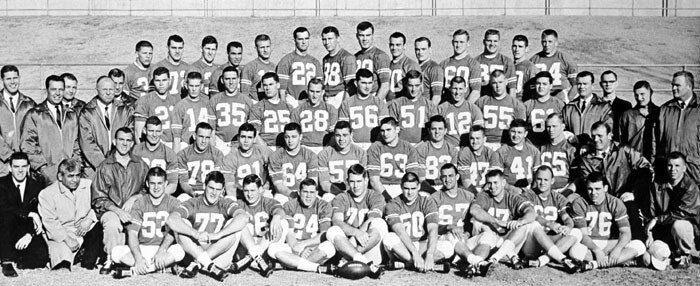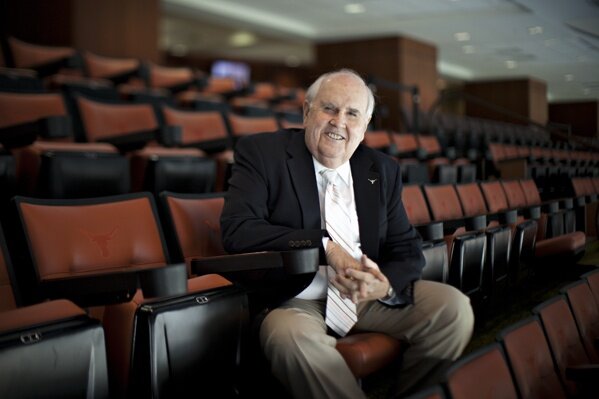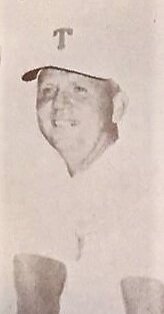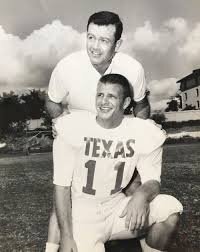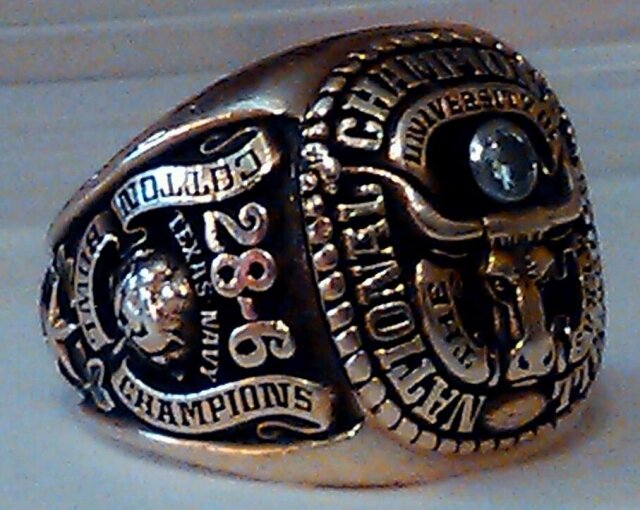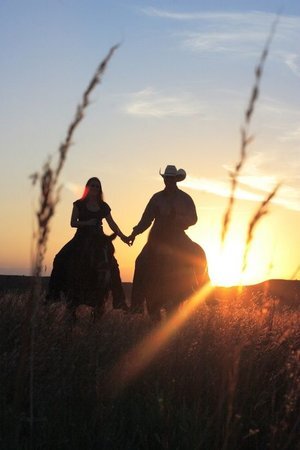It has been said that Sports is the only occupation that the fans are the “experts” and not the coach. With a sense of humor, Duke Carlisle says in his book Longhorn, and Tall Tails “Fans think coaching is a “common sense” profession. “Fans also have certain rules they expect a coach to follow, such as don’t pass if it’s going to be intercepted, or never go for two unless you make it.” Hindsight makes fans great coaches.
Click on the oral history section below to share the history of Longhorn sports through the eyes of Texas Duke Carlisle.
1963
1963 was a year of destiny and luck following the team that tried the hardest. The starting quarterback did not even make All-Southwest Conference, but he was the national championship quarterback and the MVP of the Cotton Bowl game against Navy.
Author Kern Tips says about Duke, Royal, and the rest of the team, "in addition to a sound solid, determined, panic-proof and expertly coached-and-captained team, you still need the kiss of the charmed life to bring it off."
There were four SWC games won by a touchdown or less. In several of the games, Tony's foot is the difference between competing for the national championship and a mediocre season.
Click on the link below to learn more about the DKR who built bridges for Longhorn athletes to cross.
https://texas-lsn.squarespace.com/dkr-the-bridge-builder
In high school, Royal was told by administrators that he was too small to play football, but their comments did not stop him. Royal dared to dream big and worked hard to accomplish his goals. Royal started for the high school team in Hollis and the Oklahoma Sooners. Both teams excelled under his leadership.
College Coach Royal gravitated to high school recruits who dared to dream big. Athletes who had a deep-seated passion for winning in their hearts. Individuals who possessed intangible personal assets such as attitude, pride, and spirit necessary to win close games.
Johnny Treadwell is an excellent example of Royal's keen eye for winning qualities that supersede talent. By Johnny's, on admission, he says, "Well, I found out real early that I wasn't the biggest, the strongest, or the fastest. So I just felt that I needed to play with a little more intensity." He did so, and so did Duke Carlisle.
Royal's great teams in the early '60s had many players who believed they were bigger and faster than they were, and they won. 25 of the 42 players on the 1963 national championship roster were under 200 pounds. The East Coast writers chose to disparage the Longhorn's accusing them of lacking talent, speed, and size. Freelance writer Myron Cope states that Texas is "the biggest fraud ever perpetrated on the football public... Texas plays the kind of football that was fashionable when players wore perforated cowhide helmets...Duke Carlisle executes a hand-off like a construction foreman passing a plank to a carpenter." Other writers laughed at the Longhorn’s anatomy- skinny legs and no butts.
However, History proved the East Coast Writers wrong. Construction foreman Duke threw that plank for a Cotton Bowl record in passing yardage including two touchdown catches to carpenter Phil Harris.
Daring to Dream big
08.21.2013 | Football
Bill Little commentary: When the Duke became the King
Article is archived at Texassports.com the official Longhorn website.
The article below was written by Bill Little, but photos and videos were added by Billy Dale to add dimensional context to Bill's article.
When Duke Carlisle arrived on the UT campus in the autumn of 1960, he joined a talented class of freshmen who were about to embark on one of the most incredible successful runs in Longhorn sports history.
His given name was Emmett Augustus Carlisle III, but folks just called him "Duke."
In their own way, the early 1960s at The University of Texas were a time of innocence. True enough, the "Cold War" with the Soviet Union conjured fears of "the bomb," and the country was embarking on a long-awaited brave new world when it came to racial integration. But youth was prevailing. At 43, John Kennedy was the youngest president ever elected. College guys were in love with Elizabeth Taylor and Natalie Wood (and maybe not in that order), and college football was rivaling "America's Past Time" (major league baseball) as the nation's most popular sport. A guy named Chubby Checker had everyone dancing "the Twist," the Beatles hadn't arrived in the United States, and church-going parents wondered what would become of their kids because they were intrigued by a gyrating young singer named Elvis Presley.
It was, by all accounts, a happy time.
And that was the time that a Duke became a king.
A truly great man and coach- Bill Ellington
Bill Ellington was as good a high school coach as the state had ever seen. He knew the game of football and loved the kids who played it. Ellington was kind but very competitive in everything, from kickoffs to pitching quarters. When it came to recruiting, the World War II veteran could reach back to his farming days growing up in Quinlan, Texas, and charm moms and dads and instill confidence in young high school players like the ones he had coached to great success at various stops across Texas. If he hadn't been a football coach, Ellington could have made a good living as a country lawyer or a politician. Like they used to say of the old lawmen in the black and white movies, Ellington always got his man.
And this time, he was in Athens, Texas, to lobby a young quarterback named Duke Carlisle. Before Ellington arrived at Texas, Carlisle had become enamored with the success of the Longhorns' top out of state rival -- Oklahoma. "When I was in high school in the late 1950s," Carlisle recalled in the book "What It Means To Be A Longhorn," "Oklahoma was coming to the end of their 47-game winning streak. I became more and more convinced that Oklahoma was probably where I wanted to go." It was the spring of his senior year in high school, in 1959, when he first met Bill Ellington. "I'll never forget him because if it hadn't been for him, I might never have been a Texas Longhorn. That spring, he came into my life. He was a really good guy and a fine person. He was kind and patient, and he spent time with my parents, and they got to know him. Everybody thought a lot of him. And he caused me to rethink this thing," Carlisle remembers.
When Carlisle arrived on the UT campus in the autumn of 1960, he joined a talented class of freshmen who were about to embark on one of the greatest runs of success in Longhorn history. Freshmen were not eligible for the varsity then, but they played a five-game schedule against first-year players from other schools. Carlisle and his crowd won all five. Then, in three remarkable seasons from 1961 through 1963, Texas would lose only one regular season football game and during each season would achieve a ranking of No. 1 in the nation all three years.
In the era of single platoon football, where players usually played both offense and defense, Carlisle worked at both quarterback on offense and safety on defense in both 1961 and 1962. He was a back-up signal caller to Mike Cotten in 1961, and shared the quarterbacking duties with Johnny Genung and Tommy Wade in 1962.
The song "You Gotta Be A Football Hero" may have been written back in 1933, but in the early 1960s it was still the flag bearer of all popular songs about the college game. And nobody filled the role better than Duke Carlisle. Intelligent and personable, he had a truly Texan name, a slender athletic frame, blond hair and blue eyes.
With all of that potential, he was the image of all things darn near perfect in a football-crazed state. His coach, Darrell Royal once said that "all potential means is you ain't done it yet." And in 1963, Duke Carlisle was about to realize that potential.
It was a perfect season for Texas, with a rugged defense and a power-driven offense. The victories, for the most part, came in close games, and there were many individual moments and significant stars. Royal always said games often come down what happens on five or so pivotal plays, and 1963 was no exception -- and on those five plays, Carlisle would be exceptional.
Royal once said that "luck is what happens when preparation meets opportunity," so that leaves up to discussion whether good fortune or destiny figured in the outcome of the three games which earned Carlisle immortal status as a Texas legend.
The first, of course, came in the showdown with Oklahoma -- the school from which Ellington had wooed Carlisle. With the Sooners ranked No. 1 and the Longhorns No. 2 in the nation, Carlisle led a ball control offense that rode the power sweep to a stunning 28-7 victory over OU which vaulted the Horns to a No. 1 ranking en route to their eventual national championship.
The second, however, was the most unexpected.
By all accounts, the Texas-Baylor game that season was the toughest ticket in what was then known as Texas Memorial Stadium history. The Bears, led by all-American quarterback Don Trull and his star receiver Lawrence Elkins, provided the stiffest challenge on paper to the Texas dream.
Jones Ramsey said this game attracted more media request for tickets than the 1969 Big Shoot-out.
The game turned out to be as it had been advertised. After scoring a touchdown in the third quarter, Texas held a 7-0 lead and had the ball at the Bear 13 yard line with just 2:14 to play.
Royal's veteran assistant, offensive line coach Jim Pittman, remarked to his head coach, "It's in the bag." But it wasn't. Baylor recovered a fumble on the next play with 1:53 left in the game. In the press box, high above the west stands, Royal's defensive chief Mike Campbell jumped aboard that fellow they call destiny. He told Royal to leave Carlisle -- who had not played a snap of defense since his junior season -- in the game at safety.
Relentlessly, Trull drove his team to the Texas 19. With 29 seconds left, Baylor went for the throat. The talented Elkins broke free and headed for the center of the field. He was wide open in the end zone when Trull threw the ball. It seemed the only question was whether Elkins would catch the ball, and if the Bears would go for two points after what seemed a sure touchdown that would have narrowed the score to 7-6.
DUKE'S INTERCEPTION
But at the last second, Carlisle flashed into the end zone, crossed in front of Elkins and seized the football just as it was about to drop into the Bear receiver's waiting hands. The photo -- by Richard Pipes of the Houston Chronicle -- captured the game's sudden end.
"Maybe it (Campbell's decision) was just a hunch," Carlisle would say years later. "Jim Hudson was our starting safety, and he had had a fabulous game and year. I'm convinced the result would have been the same if he'd been in there. As it turned out, it was the only defensive series I played that year."
After Texas beat TCU and survived a scare at Texas A&M, the Longhorns were voted National Champions prior to their meeting with Navy in the Cotton Bowl Classic following the season. Again, Carlisle would be called upon to play the hero's role -- this time in the unlikely position of a passing quarterback. When Texas had beaten Oklahoma, Carlisle had thrown only three passes. Navy lobbied hard for the media to re-vote after the game on the already-decided national championship, and put eight men on the line of scrimmage and dared UT to pass.
1963 National Championship Game
Carlisle responded by hitting two touchdown passes and setting a then-bowl game record with 234 yards passing, outshining Navy's Heisman Trophy winning QB, Roger Staubach.
Following his Texas career, he was a fifth round draft choice of the Green Bay Packers, but after an injury Carlisle decided to return to UT for a graduate degree in business. He became an investment banker in New York, and then returned to his wife's home in McComb, Mississippi, where he has been in the oil business for many years.
When Texas won the national championship in 2005, then President George W. Bush told Mack Brown in a telephone conversation that it was something that could never be taken away.
"A lot of people want to be the best at something," he said. "The best dad, the best worker…what you know is that in 2005, you were the best in world at what you did."
So let it be with Duke Carlisle and his teammates on that 1963 National Championship team. If the mettle of a man is proven by the heat of the fire, Carlisle did that. And, like in the old western movie, he climbed aboard his horse, and rode off with the girl into the sunset. He was, after all, a football hero.
Bill Little


